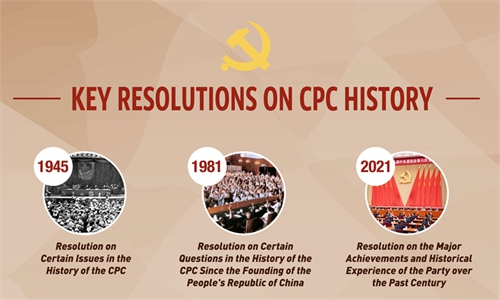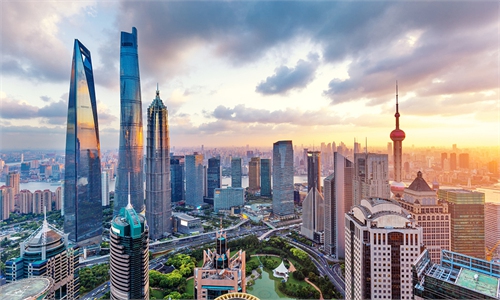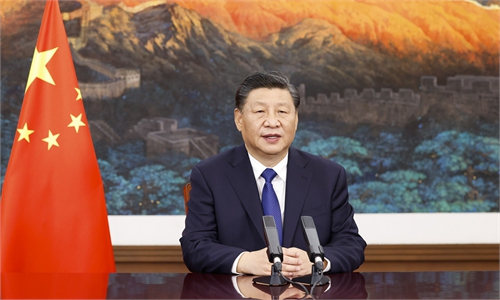GT Exclusive: West’s biggest misconception, cliché about CPC is that it’s not democratic: Italian economist
Why China can
Editor's Note:
At the remarkable moment in history of the Centennial of the Communist Party of China (CPC), the 19th Central Committee of CPC convened the sixth plenary session to comprehensively summarize the major achievements and historical experience of the Party's 100 years of endeavors. Additionally, how does the world understand the achievements of the sixth plenary session? What is the role that China could play in the future?
In the past decades, Giancarlo Elia Valori, an Italian economist and President at the International World Group, has been closely observing the development of China and introduced China's reality and the CPC's policies to the Western world. In a recent exclusive interview with the Global Times (GT) reporters Shan Jie and Lin Xiaoyi, Valori (Valori) shared his opinion on issues regarding the CPC's centennial history, China's development, and the Western world's bias against China.
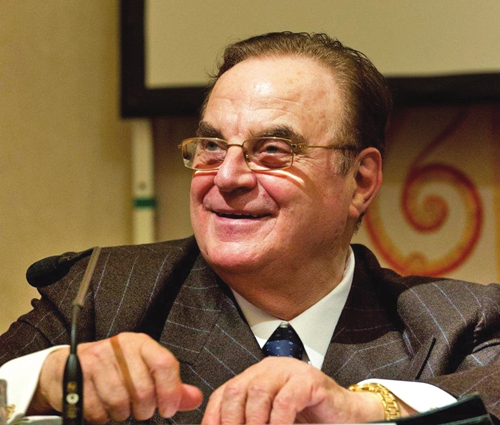
GT: In your opinion, what is the significance of the sixth plenary session and what are the highlights of the resolution?
Valori: In my opinion, the main points of the resolution can be summarized as the CPC's awareness that it has finally emerged from both structural and supra-structural contradictions, which accompanied its grandiose century-long struggle to redeem the Chinese people, and China as a whole, from imperialism, colonialism, and neo-colonialism. The People's Republic of China and the Communist Party of China demonstrate to the peoples trampled on by the superpowers of the past and of the present, that it is possible to free oneself from the domination of third parties through the ability to count on one's own strengths, despite being a developing and emerging country. In other words, to fight for multi-polarity in a world that must not have colonizers and the colonized.
GT: On the 30th anniversary of the collapse of the Soviet Union this year, what do you think were the divergent choices made by China and the Soviet Union in building socialism and exploring the democratization that led to their very different fates?
Valori: It must soon be said that while in the People's Republic of China, the CPC has always had a dialectic - even a harsh one - between the policy lines within it, thus giving way to the expression of a participatory democracy within the party itself while in the Union of Soviet Socialist Republics (USSR), monolithism was a constant feature from the moment Stalin was appointed General Secretary of the Central Committee of the Communist Party of Soviet Union (Bolshevik), on April 3, 1922. Nevertheless, while Stalin pursued a policy line that would make the USSR a messianic power both economically, as well as politically and militarily, with the advent of Khrushchev, Marxism was abandoned as central thought, opting for peaceful coexistence, wanting to emulate the US in the race for prosperity, while implementing unsuccessful policies in terms of armaments, economic affairs, and international relations, even looking at the People's Republic of China as an adversary. A stolid nomenklatura was created that was supposed to be the opposite of Stalinist "bjurokratja" (bureaucracy), but ultimately followed the downward spiral, in which Brezhnev and his successors were the gravediggers of a state that no longer had anything to say in terms of ideological and structural palingenesis.
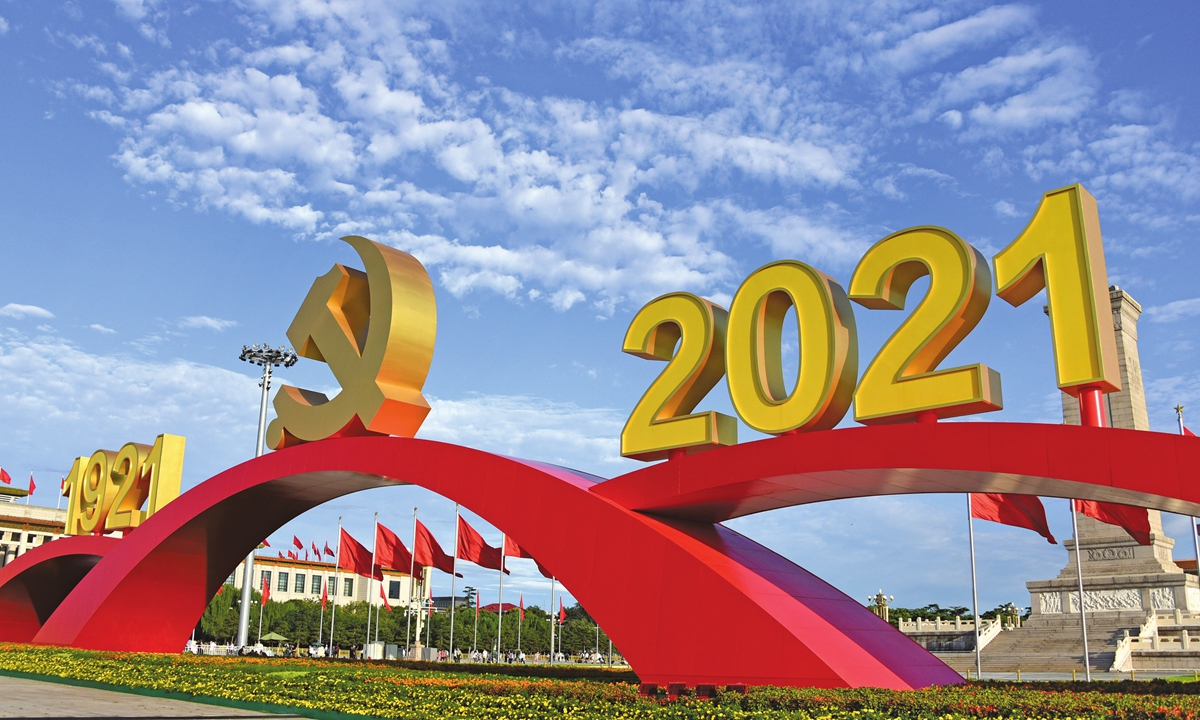
GT: You have been dealing with politicians around the world for many years. Based on your observation, what is the difference between Chinese Party officials and Western politicians?
Valori: Chinese politicians are people with a background coming from thousands of years of history. They are the heirs of Emperor Qin Shi Huangdi, if not the Yellow Emperor, Xuanyuan Huangdi. They are realistic and look at concrete matters and the interests of their own country, so that harmony is created among the people of the earth, and no one can override and overpower the others. Western politicians, who are said to be the heirs of the 1789 French revolution, have nothing revolutionary in their approach and the only concrete matter on which they focus is their interest in the welfare of banks and credit institutions, even to the detriment of the welfare achieved after the Second World War. They cherish the illusion of creating a united Europe, in which - just to give an extreme example - no citizen would ever put up with the suppression of his/her national football team in favors of a melting pot-style Europe Football Club. Lately, European politicians, following the US-style policy on human rights, have been favoring military interventions in distant countries, where they can establish dominance without any scruples. Conversely, I appreciate much more US politicians who - although lacking the wisdom and refinement of Chinese politicians - are people who serve in the interests of their own country by clearly saying what they think and answering to no one.
GT: You once met Deng Xiaoping. What was the occasion and what's your assessment of him?
Valori: I think Deng Xiaoping was one of the wisest men not only from the People's Republic of China, but also of all time. I had the opportunity to meet him in Pyongyang in September 1978, during the celebrations of the 30th anniversary of the People's Republic of Korea. That was the period leading up to China's opening to the market, announced in the famous speech delivered on December 18, 1978. It was his pragmatism and farsightedness that permitted the most astonishing economic breakthrough in 20 years, thus turning a starving rural country into a global superpower. I believe that Deng Xiaoping, a small man and a visionary, learnt the fundamental lessons of the Western model during his youth in France and succeeded in laying stable and lasting foundations for patriotic pride and personal ambition. His policies and interventions allowed for the most astonishing economic breakthrough in the history of mankind, capable of triggering one of the longest periods of expansion ever, namely three decades of growth at a rate of around 10 percent. An economic change that began in just five years, between 1979 and 1984, which enabled the most populous country on the planet - at the time just emerging from the horrors of the Cultural Revolution, on the brink of economic collapse and with large sectors of the population struggling with hunger - to leave behind centuries of isolation and backwardness and to establish itself in just a few decades as the new global superpower.
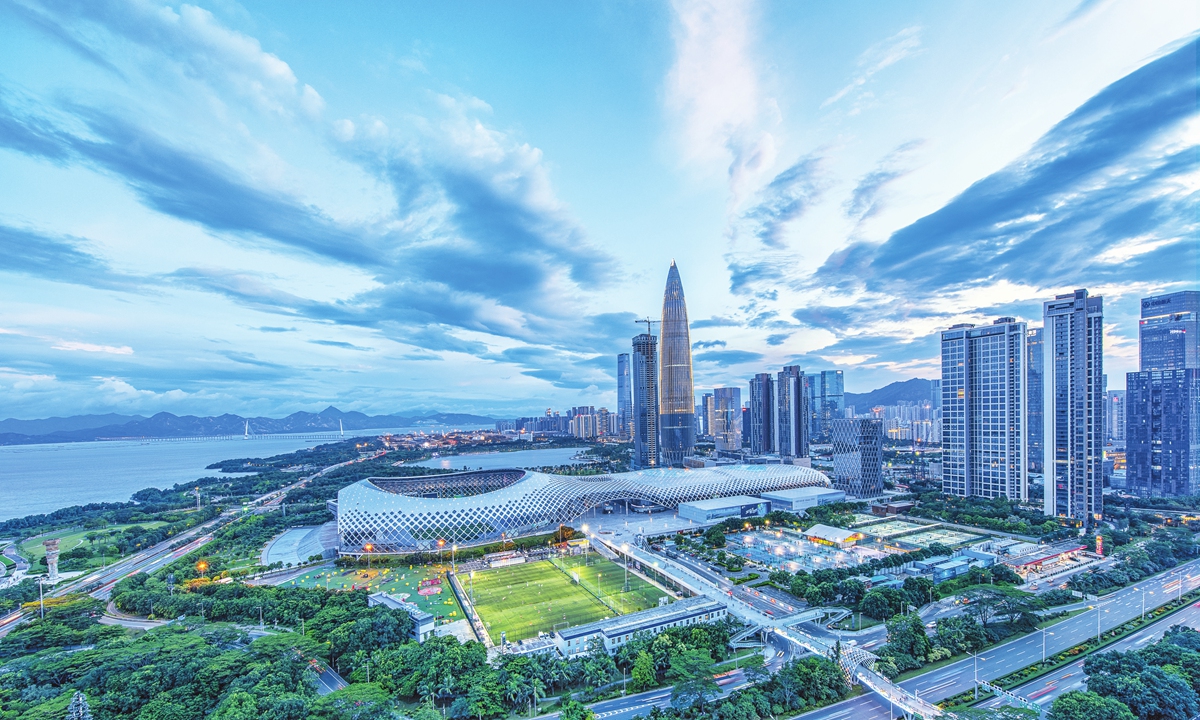
His reformist drive showed that everything could change in China except for the role of the CPC whose role remained central and unchanged.
"Crossing the river by feeling the stones" was the saying of Deng Xiaoping, a great statesman who combined realism and gradualism, in line with Chinese wisdom. Like many people, I consider him to be the general manager of the greatest poverty reduction program ever implemented.
GT: In your opinion, what is the biggest misconception about the CPC held by Western society? How did this come about?
Valori: The biggest misconception and cliché about the CPC held by Western politicians is that it is not democratic. Obviously, when saying so, they assume that the "true" democracy is their own, the one that drops bombs on people to impose it on ignorant, backward people, and dictators who are not their friends.
GT: For a long time now the image of the CPC in the West has been demonized by the media and politicians. Why do you think this has happened? Why do these Western factions formulate continuous and sustained smear campaigns against the CPC?
Valori: The smear campaigns against the People's Republic of China are actually directed from the US and the NATO countries, and their governments have no choice but to obey the White House through the media, social networks, press, and television. I believe that the opinions of the people in these states are very different. In the aftermath of the USSR collapse - when the People's Republic of China had not yet emerged and stood to the fore as it does today - China was not frightening but, after 30 years, things have changed considerably, and Public Enemy No. 1 - after the phase of the Muslim threat - is once again a Marxist one, namely the CPC. I do not think anything more can be said.
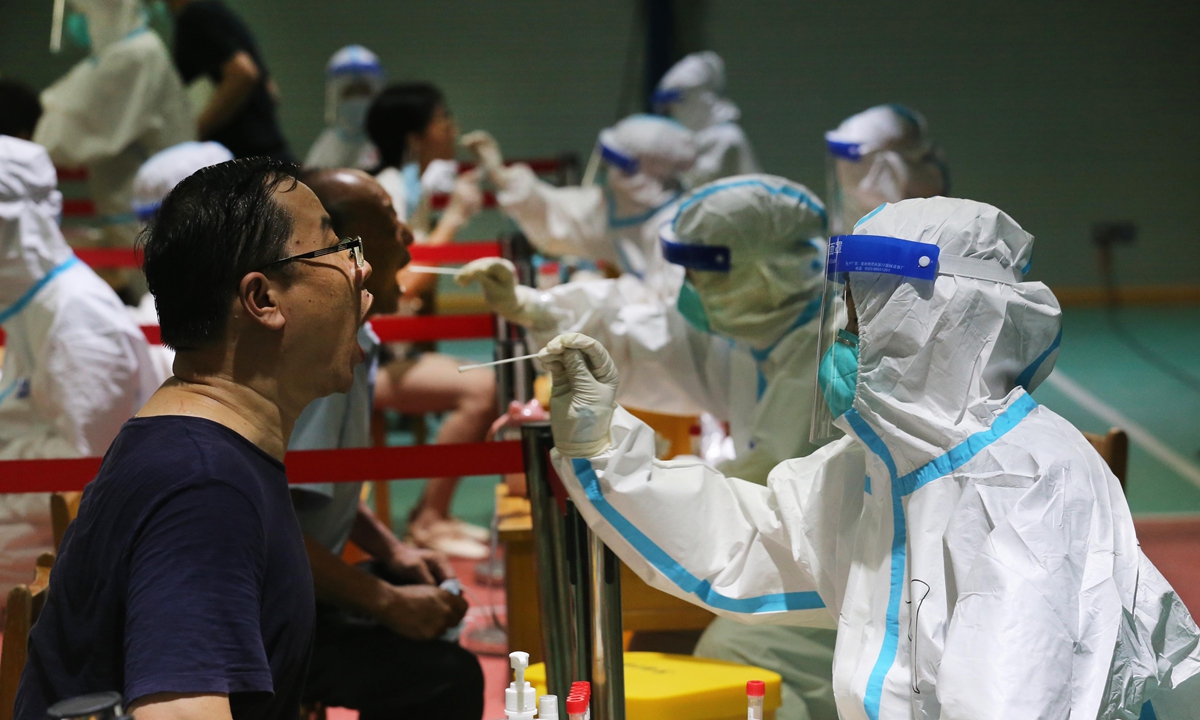
Valori: Let us get one thing straight, without fuelling an argument between supporters of vaccines and those who oppose them. Vaccines are clearly a great business for big pharmaceutical companies, mostly Western one. If the Chinese system of containment had been apPlied, there would have been no need for vaccines, and consequently no need to spend billions of dollars to buy them. Hence the Chinese political system is not favored by the West, precisely because it is able to quickly regain its vitality in a post-pandemic era, with the related solutions.
At the G20 summit in Italy in October, many "Chinese solutions" attracted global attention, but in recent days, many European politicians have been making provocations toward China's human rights and sovereignty issues in the island of Taiwan and Xinjiang Uygur Autonomous Region. How do you evaluate their political maneuvering? Will such discordant voices affect international cooperation and exchanges between China and Europe?
Every time the People's Republic of China offers win-win possibilities, to the satisfaction of its counterparts, the issue of Xinjiang and the issue of Taiwan crop up again.
But let us take a closer look at these issues.
The US, Canada, the UK and the European Union took concerted action to announce sanctions against human rights violations of Uygurs and other ethnic minorities in the Xinjiang region. Furthermore, Australia and New Zealand also issued statements expressing support for joint sanctions against China by the White House and the European Union. US Secretary of State Tony Blinken stated that "the joint transatlantic operation sends a strong signal to those who violate or trample on international human rights."
This joint operation is clearly part of an effort made by the US to work with its Western allies against China through diplomatic actions.
After long and exhausting wars in the Balkans, Afghanistan, Iraq, Libya, Syria, and beforehand in Korea and Vietnam, we wonder:
1) Why do we want to open another front to export democracy with bombs?
2) Why has the Xinjiang issue become an excruciating topic that brings together the US and its allies to jointly impose sanction on China, while ignoring the behaviors codified by the allied Gulf monarchies?
3) Why is the Xinjiang issue attracting ever more attention from the international community?
4) Why does the US use the human rights issues in the Xinjiang region to create a diplomatic trend with Western allies against China and forget about the black people being murdered in the US streets?
The same holds true for Taiwan, which many are eager to turn into a military base aimed at the People's Republic of China. Obviously - according to the usual suspects - for "freedom," "democracy" and "human rights."
At the remarkable moment in history of the Centennial of the Communist Party of China (CPC), the 19th Central Committee of CPC convened the sixth plenary session to comprehensively summarize the major achievements and historical experience of the Party's 100 years of endeavors. Additionally, how does the world understand the achievements of the sixth plenary session? What is the role that China could play in the future?
In the past decades, Giancarlo Elia Valori, an Italian economist and President at the International World Group, has been closely observing the development of China and introduced China's reality and the CPC's policies to the Western world. In a recent exclusive interview with the Global Times (GT) reporters Shan Jie and Lin Xiaoyi, Valori (Valori) shared his opinion on issues regarding the CPC's centennial history, China's development, and the Western world's bias against China.

Giancarlo Elia Valori
GT: In your opinion, what is the significance of the sixth plenary session and what are the highlights of the resolution?
Valori: In my opinion, the main points of the resolution can be summarized as the CPC's awareness that it has finally emerged from both structural and supra-structural contradictions, which accompanied its grandiose century-long struggle to redeem the Chinese people, and China as a whole, from imperialism, colonialism, and neo-colonialism. The People's Republic of China and the Communist Party of China demonstrate to the peoples trampled on by the superpowers of the past and of the present, that it is possible to free oneself from the domination of third parties through the ability to count on one's own strengths, despite being a developing and emerging country. In other words, to fight for multi-polarity in a world that must not have colonizers and the colonized.
GT: On the 30th anniversary of the collapse of the Soviet Union this year, what do you think were the divergent choices made by China and the Soviet Union in building socialism and exploring the democratization that led to their very different fates?
Valori: It must soon be said that while in the People's Republic of China, the CPC has always had a dialectic - even a harsh one - between the policy lines within it, thus giving way to the expression of a participatory democracy within the party itself while in the Union of Soviet Socialist Republics (USSR), monolithism was a constant feature from the moment Stalin was appointed General Secretary of the Central Committee of the Communist Party of Soviet Union (Bolshevik), on April 3, 1922. Nevertheless, while Stalin pursued a policy line that would make the USSR a messianic power both economically, as well as politically and militarily, with the advent of Khrushchev, Marxism was abandoned as central thought, opting for peaceful coexistence, wanting to emulate the US in the race for prosperity, while implementing unsuccessful policies in terms of armaments, economic affairs, and international relations, even looking at the People's Republic of China as an adversary. A stolid nomenklatura was created that was supposed to be the opposite of Stalinist "bjurokratja" (bureaucracy), but ultimately followed the downward spiral, in which Brezhnev and his successors were the gravediggers of a state that no longer had anything to say in terms of ideological and structural palingenesis.

Decorations to mark the Centennial of the Communist Party of China are displayed at the Tiananmen Square in Beijing in July, 2021. Photo: VCG
GT: You have been dealing with politicians around the world for many years. Based on your observation, what is the difference between Chinese Party officials and Western politicians?
Valori: Chinese politicians are people with a background coming from thousands of years of history. They are the heirs of Emperor Qin Shi Huangdi, if not the Yellow Emperor, Xuanyuan Huangdi. They are realistic and look at concrete matters and the interests of their own country, so that harmony is created among the people of the earth, and no one can override and overpower the others. Western politicians, who are said to be the heirs of the 1789 French revolution, have nothing revolutionary in their approach and the only concrete matter on which they focus is their interest in the welfare of banks and credit institutions, even to the detriment of the welfare achieved after the Second World War. They cherish the illusion of creating a united Europe, in which - just to give an extreme example - no citizen would ever put up with the suppression of his/her national football team in favors of a melting pot-style Europe Football Club. Lately, European politicians, following the US-style policy on human rights, have been favoring military interventions in distant countries, where they can establish dominance without any scruples. Conversely, I appreciate much more US politicians who - although lacking the wisdom and refinement of Chinese politicians - are people who serve in the interests of their own country by clearly saying what they think and answering to no one.
GT: You once met Deng Xiaoping. What was the occasion and what's your assessment of him?
Valori: I think Deng Xiaoping was one of the wisest men not only from the People's Republic of China, but also of all time. I had the opportunity to meet him in Pyongyang in September 1978, during the celebrations of the 30th anniversary of the People's Republic of Korea. That was the period leading up to China's opening to the market, announced in the famous speech delivered on December 18, 1978. It was his pragmatism and farsightedness that permitted the most astonishing economic breakthrough in 20 years, thus turning a starving rural country into a global superpower. I believe that Deng Xiaoping, a small man and a visionary, learnt the fundamental lessons of the Western model during his youth in France and succeeded in laying stable and lasting foundations for patriotic pride and personal ambition. His policies and interventions allowed for the most astonishing economic breakthrough in the history of mankind, capable of triggering one of the longest periods of expansion ever, namely three decades of growth at a rate of around 10 percent. An economic change that began in just five years, between 1979 and 1984, which enabled the most populous country on the planet - at the time just emerging from the horrors of the Cultural Revolution, on the brink of economic collapse and with large sectors of the population struggling with hunger - to leave behind centuries of isolation and backwardness and to establish itself in just a few decades as the new global superpower.

Shenzhen Photo: VCG
His reformist drive showed that everything could change in China except for the role of the CPC whose role remained central and unchanged.
"Crossing the river by feeling the stones" was the saying of Deng Xiaoping, a great statesman who combined realism and gradualism, in line with Chinese wisdom. Like many people, I consider him to be the general manager of the greatest poverty reduction program ever implemented.
GT: In your opinion, what is the biggest misconception about the CPC held by Western society? How did this come about?
Valori: The biggest misconception and cliché about the CPC held by Western politicians is that it is not democratic. Obviously, when saying so, they assume that the "true" democracy is their own, the one that drops bombs on people to impose it on ignorant, backward people, and dictators who are not their friends.
GT: For a long time now the image of the CPC in the West has been demonized by the media and politicians. Why do you think this has happened? Why do these Western factions formulate continuous and sustained smear campaigns against the CPC?
Valori: The smear campaigns against the People's Republic of China are actually directed from the US and the NATO countries, and their governments have no choice but to obey the White House through the media, social networks, press, and television. I believe that the opinions of the people in these states are very different. In the aftermath of the USSR collapse - when the People's Republic of China had not yet emerged and stood to the fore as it does today - China was not frightening but, after 30 years, things have changed considerably, and Public Enemy No. 1 - after the phase of the Muslim threat - is once again a Marxist one, namely the CPC. I do not think anything more can be said.

A mass nucleic acid testing in Nanjing, East China's Jiangsu Province in August, 2021 Photo: VCG
GT: You have criticized the US for spreading the "China virus" theory around the world. Since the outbreak, compared with China's rapid and effective containment of the epidemic, we have seen many countries, especially self-proclaimed "democratic countries," fail in their efforts to fight the epidemic and maintain social stability. What do you think is the reason for this phenomenon? Why is China, whose political system is not favored by the West, able to quickly regain its vitality in a post-epidemic era?Valori: Let us get one thing straight, without fuelling an argument between supporters of vaccines and those who oppose them. Vaccines are clearly a great business for big pharmaceutical companies, mostly Western one. If the Chinese system of containment had been apPlied, there would have been no need for vaccines, and consequently no need to spend billions of dollars to buy them. Hence the Chinese political system is not favored by the West, precisely because it is able to quickly regain its vitality in a post-pandemic era, with the related solutions.
At the G20 summit in Italy in October, many "Chinese solutions" attracted global attention, but in recent days, many European politicians have been making provocations toward China's human rights and sovereignty issues in the island of Taiwan and Xinjiang Uygur Autonomous Region. How do you evaluate their political maneuvering? Will such discordant voices affect international cooperation and exchanges between China and Europe?
Every time the People's Republic of China offers win-win possibilities, to the satisfaction of its counterparts, the issue of Xinjiang and the issue of Taiwan crop up again.
But let us take a closer look at these issues.
The US, Canada, the UK and the European Union took concerted action to announce sanctions against human rights violations of Uygurs and other ethnic minorities in the Xinjiang region. Furthermore, Australia and New Zealand also issued statements expressing support for joint sanctions against China by the White House and the European Union. US Secretary of State Tony Blinken stated that "the joint transatlantic operation sends a strong signal to those who violate or trample on international human rights."
This joint operation is clearly part of an effort made by the US to work with its Western allies against China through diplomatic actions.
After long and exhausting wars in the Balkans, Afghanistan, Iraq, Libya, Syria, and beforehand in Korea and Vietnam, we wonder:
1) Why do we want to open another front to export democracy with bombs?
2) Why has the Xinjiang issue become an excruciating topic that brings together the US and its allies to jointly impose sanction on China, while ignoring the behaviors codified by the allied Gulf monarchies?
3) Why is the Xinjiang issue attracting ever more attention from the international community?
4) Why does the US use the human rights issues in the Xinjiang region to create a diplomatic trend with Western allies against China and forget about the black people being murdered in the US streets?
The same holds true for Taiwan, which many are eager to turn into a military base aimed at the People's Republic of China. Obviously - according to the usual suspects - for "freedom," "democracy" and "human rights."
